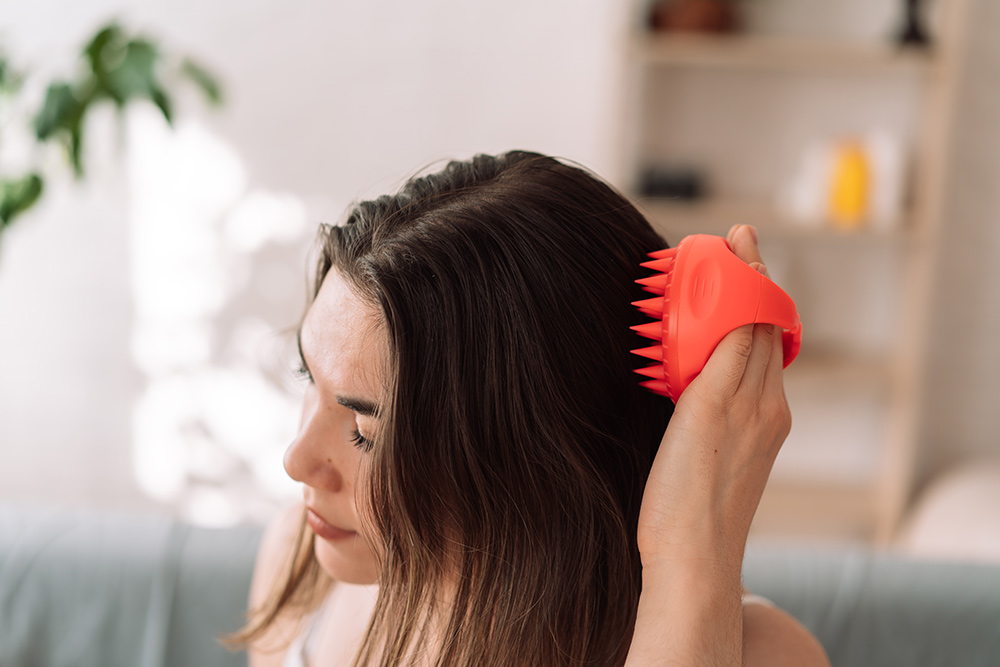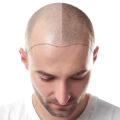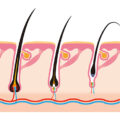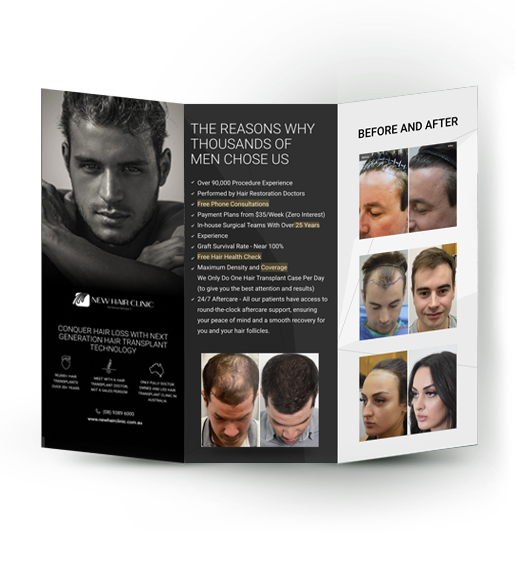Last updated on August 8, 2024
If you’re sitting there wondering “Why is my hair falling out?” then this article is for you! Hair loss, or alopecia, is a common concern affecting both men and women. While it can be a distressing experience, understanding the potential causes can help you address the issue effectively. Here are some common reasons for hair loss as well as effective solutions from New Hair Clinic in Perth.
Common Reasons for Hair Loss in Women
Here are some of the reasons why women experience hair loss:
-
Female Pattern Hair Loss
Also called female pattern baldness, female pattern hair loss is a hereditary condition that typically causes overall thinning on the scalp, maintaining a normal hairline. Unlike male pattern baldness, it rarely leads to complete baldness.
-
Hormonal Changes
Women’s hair is significantly influenced by hormones. Fluctuations due to pregnancy, childbirth, menopause, or underlying conditions like polycystic ovary syndrome (PCOS) can lead to hair thinning.
-
Medical Conditions
Thyroid disorders, anemia, and autoimmune diseases like alopecia areata can cause hair loss in women.
-
Chronic or High Stress
Severe or prolonged stress can trigger telogen effluvium, a condition where hair prematurely enters the resting phase, leading to shedding.
-
Nutritional Deficiencies
Lack of iron, zinc, biotin, or other essential nutrients can impact hair health.
-
Hair Styling Practices
Tight hairstyles can cause traction alopecia (hair pulled out at the roots and damaged hair follicles) while excessive heat styling and harsh hair products can damage hair and lead to breakage.
Common Reasons for Thinning Hair in Men
Here are some common causes of male hair loss and hair thinning:
-
Hereditary Hair Loss (Androgenetic Alopecia)
Androgenetic alopecia is the most common cause of hair loss in men, often characterised by a receding hairline or thinning crown. It’s genetically influenced and the hormone DHT (dihydrotestosterone) plays a significant role.
-
Hormonal Changes
While less common than in women, hormonal imbalances can contribute to hair loss in men.
-
Medical Conditions
Certain medical conditions like scalp infections or autoimmune diseases can cause hair loss.
-
Medications and Treatments
Some medications and medical treatments can lead to temporary or permanent hair loss.
-
Chronic or Severe Stress
As with women, long term stress or very high stress can contribute to hair loss in men.

Remember, it’s essential to consult with a healthcare professional for an accurate diagnosis and personalised treatment plan to uncover the cause of your hair fall and viable solutions for hair restoration.
Identifying Why You’re Losing Hair
Determining the exact cause of your hair loss requires a comprehensive evaluation. Factors such as the pattern of hair loss, associated symptoms, and medical history can provide valuable clues. It’s essential to consult with a healthcare professional or a specialist at a hair loss clinic for an accurate diagnosis and the best hair loss treatment plan.
When to Seek Professional Help for Your Hair Loss
If you’re experiencing excessive hair loss, it’s advisable to seek medical advice. A healthcare professional can conduct a thorough examination, rule out underlying medical conditions, and recommend appropriate treatments.
At New Hair Clinic Perth, our experts specialise in diagnosing and treating hair loss. We offer comprehensive consultations to understand your specific concerns and develop a personalised treatment plan.
How to Prevent Further Hair Loss
While there’s no guaranteed way to prevent all hair loss, adopting healthy hair care practices can contribute to overall hair health:
-
Gentle Hair Care
Avoid harsh hair treatments, excessive heat styling, and tight hairstyles.
-
Balanced Diet
Consume a diet rich in vitamins and minerals essential for hair health.
Vitamins:
- Vitamin A: Supports sebum production for scalp moisture.
- Vitamin C: Antioxidant that protects hair follicles from damage.
- Vitamin D: May influence hair growth cycles.
- Vitamin E: Antioxidant that protects cell membranes, including hair follicles.
- B Vitamins (B12, biotin, folic acid, niacin): Involved in cell growth and red blood cell production, essential for hair health.
Minerals:
- Iron: Carries oxygen to hair follicles, deficiency can lead to hair loss.
- Zinc: Supports hair growth and repair.
- Selenium: Antioxidant that protects hair follicles.
-
Stress Management
Practice stress-reduction techniques like meditation, yoga, or deep breathing.
-
Regular Scalp Care
Maintain a clean and healthy scalp to promote hair growth.

From a balanced diet to gentle scalp care, there are many ways to help reduce hair loss at home. If hair fall is severe, book a consultation at our hair loss clinic and take action against hair loss today!
Stop Hair Loss with New Hair Clinic Perth
Discover the power of proven solutions against hair loss. Whether it’s stopping excessive hair fall or fostering hair regrowth, our range of clinically-backed treatments offers you a path to reclaiming your hair. Our range of safe, effective treatments for female pattern hair loss and male pattern balding include hair transplants, DHT blockers and prescription medications, growth factor therapy, and more.
Remember, early intervention is key when it comes to hair loss. Don’t hesitate to seek professional help if you’re concerned about excessive hair shedding.
FAQs
How much hair loss is normal?
It’s natural to shed a certain number of hairs daily, typically around 50-100. However, excessive hair loss, noticeable thinning, or bald patches are not normal. These could signal an underlying health condition or imbalance. Book an appointment at our hair loss clinic for evaluation and safe, effective treatment options.
Can stress cause permanent hair loss?
While stress often triggers temporary hair loss (telogen effluvium), it usually regrows once the stressor is managed. However, chronic or severe stress might contribute to more persistent hair loss or even exacerbate other underlying hair loss conditions.
Will my hair grow back on its own?
Hair regrowth depends on the cause of hair loss. Temporary conditions like telogen effluvium often resolve on their own, allowing hair to regrow. But permanent hair loss, such as in cases of androgenetic alopecia, may require medical intervention such as hair transplantation, growth factor PRP treatment, or prescription hair loss medication to support potential regrowth.
Are there any home remedies for hair loss?
Many home remedies are available, but scientific evidence supporting their effectiveness for hair loss is limited. While some might improve scalp health or hair condition, they rarely address the root cause of hair loss. It’s essential to consult a healthcare professional for proper diagnosis and treatment.
Can diet affect hair growth?
Absolutely. A balanced diet rich in vitamins, minerals, and protein is vital for overall health, including hair. Deficiencies in nutrients like iron, zinc, biotin, and vitamins B7 and B12 can contribute to hair loss or thinning. However, addressing nutritional deficiencies alone might not resolve underlying hair loss conditions.
How can a hair loss clinic help me?
A hair loss clinic offers expert diagnosis, tailored treatment plans, and advanced procedures. They can identify the cause of your hair loss, recommend suitable treatments like medication, laser therapy, or hair transplants, and provide ongoing support and monitoring for optimal results. Schedule your hair loss analysis at New Hair Clinic Perth today.
What are the best non-surgical hair loss treatments?
Non-surgical options for treating hair loss effectively include:
-
Medications
DHT blockers and prescription hair loss medications can slow hair loss and promote regrowth.
-
Growth factor treatment
Injections or topical applications of growth factors can stimulate hair follicles.
-
Alopecia areata injections
Corticosteroid injections can be effective for treating patchy hair loss.
Contact our hair loss clinic in Perth today for safe, effective surgical and non-surgical solutions.








